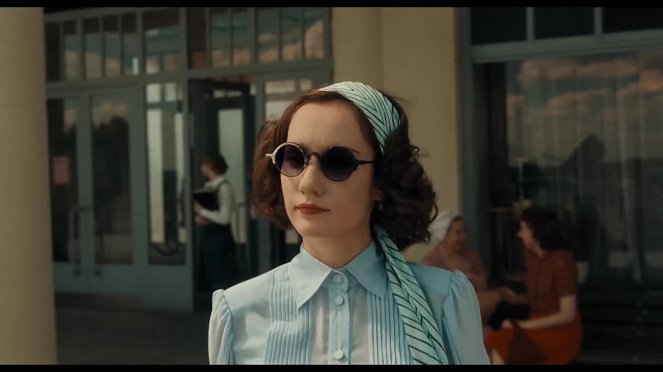Directed by:
Matěj ChlupáčekScreenplay:
Miro ŠifraCinematography:
Martin DoubaComposer:
Simon GoffCast:
Eliška Křenková, Miloslav König, Milan Ondrík, Marián Mitaš, Luboš Veselý, Martha Issová, Ladislav Hampl, Ján Jackuliak, Anton Šulík ml., Richard Langdon (more)Plots(1)
In the 1930s, a pregnant doctor must navigate a web of superstition and prejudice while seeking the truth about a shocking find at her husband's factory. (Netflix)
Videos (4)
Reviews (8)
We Have Never Been Modern benefits from an unusual premise – by Czech, but I think also by international standards – and it combines several thematic or genre levels quite skillfully: from a relationship drama through a (pseudo)crime story to a certain social probe into the 1930s, but with timeless insight. Matěj Chlupáček's film could certainly be faulted for a few things, like Helena's period inauthentic speech (especially in the field of sarcasm) or Ladislav Hampl's prosthetics (there must be a more "plump" colleague among Czech actors), but for my part, the rather positive impressions prevail. Hermaphroditism (like aphasia in this year's Exhale) is not a common theme and certainly holds other possibilities. In We Have Never Been Modern, this theme is enlivened by an appealing period colour – here I would like to praise the production design in particular, but also the costumes – and several leading dichotomies (man x woman, factory employee x worker, "divine creature" x "unholy monster"). Of the cast, I would single out Eliška Křenková and Richard Langdon; I was also impressed by the smaller role of Ján Jackuliak, who provided one of the film's strongest moments. I am curious to see what project Chlupáček will come up with next.
()
It’s a shame that of all the topics raised in We Have Never Been Modern (the Czech industrialist Baťa’s utopia/dystopia, tolerance, the political grudges of the First Republic, women’s standing in society), the film doesn’t really develop any of them and rather merely presents them. Similarly, it awkwardly shifts between the genre layers of an otherwise appealingly constructed story. The film seems as neglected as the female protagonist, whose suspicious “rightness” becomes problematic only in the end. The powerful dilemma is resolved very carefully in the comfort zone of Baťa-style modernism. We Have Never Been Modern proceeds with caution and is a bit clumsy in explaining things (the doctor’s animated lecture about hermaphroditism was the only WTF moment). In spite of that, however, it is one of the most interesting films that Czech cinema has generated in recent years. The attempt to be different and to make a masterfully crafted period piece is quite obvious, but I couldn’t shake off the impression that the film occasionally couldn’t get out of its own way in its effort to not go down the well-trodden paths.
()
It's too ambitious and at the same time too weak. It has no particular genre and it is uncertain. Is it a thriller? Is it a crime story? A drama? A period piece? A psychological film? A modern melodrama? Nobody knows, but many viewers applaud it because it's simply different. Some are distracted by the picturesque Tatra Mountains and the setting of the Baťa plant. Other viewers are drawn in by the hermaphroditism and few see how weak the psychological connection between the main characters is, the interactions between the supporting characters are rushed, and although We Have Never Been Modern has successful camera work, set design, costumes, and mask, it only loosely adheres to the reality of 1937. These are actors adjusted to the latest trends of barber shops, jerseys, and hoodies... which are understandable today, but nonsensical in the given period piece. Some details are successful, such as the use of František Krištof Veselý's song, but the whole fails. Whether as a crime, drama, or educational film.
()
An above-averagely filmed average parable whose plot doesn't surprise much and whose characters (with perhaps one exception) hardly step out of the tightly packed boxes the script has assigned them. And while the message is commendable, We Have Never Been Modern ultimately comes off as rather ham-fisted. It's a pity that the they didn't reach for, for instance, the story of Zdeňka Koubeková/Zdeněk Koubek from the same period, which is more interesting and, more importantly, actually happened.
()
For a 29-year-old director, this is an extremely ambitious work with powerful, intimate moments involving an original, socially sensitive subject. We Have Never Been Modern works fantastically in its timeless message about society’s ineradicable narrow-mindedness, prejudice and intolerance of anything different. However, it won’t work for everyone when it comes to the interplay of secondary themes (the problematic relationship between the protagonist and her careerist husband, the disturbing character of the counter-intelligence agent) or by setting it in a planned industrial microcosm. Nevertheless, that microcosm adds to the film’s attractiveness for the viewer, while also giving the story a historical foundation to better underscore the concept. And with the nicely stylized studio sets in the foreground of the High Tatras, it also forms the creative patina of the artistic parable. Though it’s not perfect in every detail, it is certainly something that most Czech filmmakers would not dare to attempt. Matěj Chlupáček is somewhere else and if he follows the same path over the next decade as he did between Touchless and We Have Never Been Modern, his third feature film will receive standing ovations at Cannes and Venice. [Karlovy Vary International Film Festival]
()



Ads